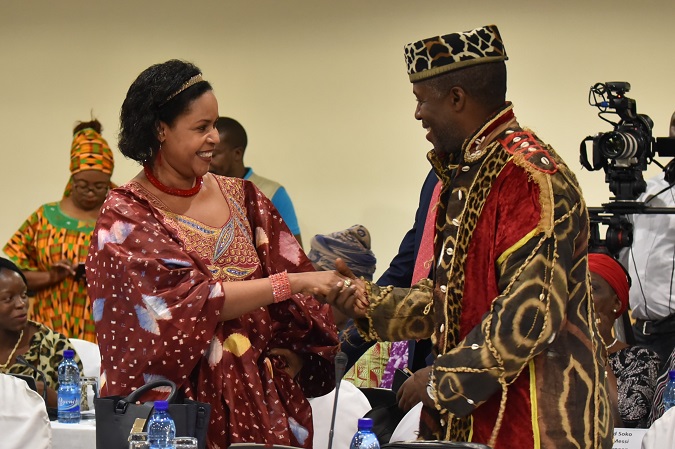Traditional Leaders meet in Blantyre to address child marriage in Africa
Date:

Many countries in the Sub Saharan Africa have high rates of child marriage. This is despite existence of laws that prohibit child marriage and set minimum marriage ages, the situation persists in part because of the strong traditional and religious practices which make it difficult to enforce the laws. Research has shown that tradition and religion remain the strongest enablers of major causes of child marriage. Other reasons established for the perpetuation of child marriage include poverty, gender discrimination, limited education, lack of economic options, insecurity in the face of conflict, child abduction and forced marriage in conflict situations.
To address this challenge UN Women is engaging traditional and cultural institutions through a series of regional consultations. The first meeting was held in Nairobi and brought together over 30 Traditional Leaders from 17 countries in Africa. As a result, a regional consultation aimed at galvanizing and amplifying the efforts and strategies implemented by Traditional Leaders to end child marriage, FGM and other harmful practices in East and Southern Africa held in Blantyre, Malawi from 30th October to 2nd November 2018 with over 140 traditional leaders in attendance.
Speaking at the event, Hon. Kondwani Nankhumwa, Minister of local government and Rural Development stated that Malawi has extended the age of a child to 18, thereby prohibiting any marriage for a child. Traditional leaders have been very instrumental in fighting child marriage, FGM and other harmful practices. Malawi is also removing all barriers that limit the girls staying in school as well as protecting girls and women from sexual violence. He appreciated chiefs for being very instrumental in the promotion of women’s rights and called for a clear action plan to advocate for change within the community and examine status of laws and how those laws can be implemented across the continent.
His counterpart Hon. Jean Kalilani, Minister of Gender, Children Disability and Social welfare Malawi, emphasized the negative effects of child marriage stating that “Traditional leaders are the backbone of our communities, they are the symbols of our identity as African, they preserve our culture and historical roots. This conference provides an opportunity for sharing best practices for ending child marriages. Child early and forced marriages perpetuate human rights violations. This practice hinders boys and girls from obtaining education and ultimately choosing their own destiny.”
Malawi has one of the world’s highest rates of child marriage. Half of girls are married before the age of 18, many because their families are too poor to support them. Teen pregnancies contribute to 20-30 per cent of maternal deaths in the country, and the low share of girls, only about 45 per cent, remaining in school past the 8th grade. Traditional leaders in Malawi, recognize that under-age marriages and FGM are counter-productive and are at the forefront of dissolving all marriages involving under-age girls in various chiefdoms.
Child marriage is a human rights violation that has persisted despite laws against it and the practice remains widespread: Globally, one in every five girls is married, or is in union, before reaching age 18. In the least developed countries, that number doubles – 40 per cent of girls are married before age 18, and 12 per cent of girls are married before age 15. According to the United Nations Convention on the Rights of the Child, forced and early marriage denies children their right to protection from harmful practices, abuse and exploitation, and takes away their right to develop to their fullest. Most countries have ratified this convention; however, the age of consent varies and is often below the UN recommended age of 18.
“For us to achieve the development of Africa and for the continent to harness its singular most important resource, we must prioritize investment in girls and the advancement of gender equality”, stated Nyaradzayi Gumbonzvanda, African Union Goodwill Ambassador on Ending Child Marriage
The continent is however making progress. In May 2014, the African Union launched the national campaign to end child marriage, as a critical intervention toward achieving the commitment in agenda 2063. In 2015, the Africa Common Position on ending child marriage was adopted by the AU Heads of States at a Summit, and the first ever Africa Girls Conference on Ending Child Marriage was held in Maya, Zambia.
UN Women’s Africa Strategic Plan has prioritized protecting the health and well-being of women and girls of Africa by supporting interventions that end Harmful Social Practices, particularly child marriage and Female Genital Mutilation. UN Women has made a strategic choice of placing the leadership and engagement of traditional authorities central to addressing the cultural norms and practices that promote child marriage and Female Genital Mutilation.